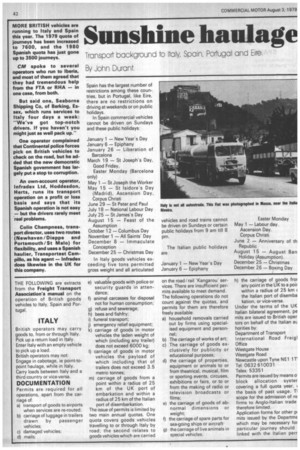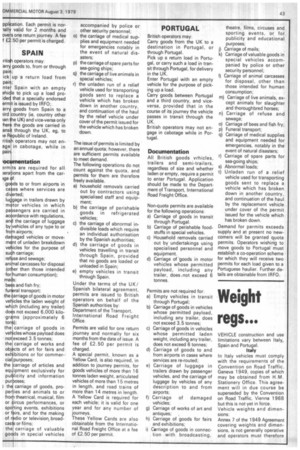THE FOLLOWING are extracts from the Freight Transport Association's manual
Page 44

Page 45

If you've noticed an error in this article please click here to report it so we can fix it.
on the operation of British goods vehicles to Italy, Spain and Portugal.
ITALY
British operators may carry goods to, from or through Italy. Pick up a return load in Italy, Enter Italy with an empty vehicle to pick up a load.
British operators may not Engage in cabotage, ie point-topoint haulage, while in Italy. Carry loads between Italy and a third country or vice-versa.
DOCUMENTATION
Permits are required for all operations, apart from the carriage of a) transport of goods to airports when services are re-routed; b) carriage of luggage in trailers drawn by passenger vehicles; c) damaged vehicles;
e) valuable goods with police or security guards in attendance; f) animal carcasses for disposal not for human consumption; g) refuse and sewerage; h) bees and fishfry; i) funeral transport; j) emergency relief equipment;
k) carriage of goods in motor vehicles the laden weight of which (including any trailer) does not exceed 6000 kg;
I) carriage of goods in motor vehicles the payload of which including that of trailers does not exceed 3.5 metric tonnes; m) carriage of goods from a point within a radius of 25 km of the UK port of embarkation and within a radius of 25 km of the Italian port of disembarkation, The issue of permits is limited by two main annual quotas. One quota covers goods vehicles travelling to or through Italy by road; the second relates to goods vehicles which are carried on the road/rail 'Kangarou' services. There are insufficient permits available to meet demand. The following operations do not count against the quotas, and permits for them are therefore freely available, a) household removals carried out by firms using specialised equipment and personnel; b) The carriage of works of art; c) The carriage of goods exclusively for publicity or educational purposes; d) the carriage of properties, equipment or animals to or from theatrical, musical, film or sporting events, circuses, exhibitions or fairs, or to or from the making of radio or television broadcasts or films; e) the carriage of goods of abnormal dimensions or weight;
f) the carriage of spare parts for sea-going ships or aircraft.
9) the carriage of live animals in special vehicles; h) the carriage of goods fror any point in the UK to a pair within a radius of 25 km c the Italian port of disemba kation, or vice-versa. Under the terms of the UK Italian bilateral agreement, pe mits are issued to British oper tors on behalf of the Italian au horities by Department of Transport International Road Freigl Office
Westgate House
Westgate Road Newcastle upon Tyne NE1 1TI Tel: 0632 610031 Telex. 53351
Permits are issued by means o. block allocation syster covering a full quota year, the basis of past usage. TI scope for the admission of nE firms to Anglo-Italian trade therefore limited.
Application forms for other pi mits issued by the DepartmE which may be necessary for particular journey should linked with the Italian perr pplication. Each permit is norlallw valid for 2 months and Dye's one return journey. A fee f £2.50 per permit is charged.
SPAIN
ritisti operators may .arry goods to, from or through pain; ick up a return load from pain; nte' Spain with an empty ehicle to pick up a load proided that a specially endorsed erm t is issued by IRFO; arry goods from Spain to a iird country (ie, country other ian the UK) and vice-versa only 'here the goods are carried in ansit through the UK, eg, to re Republic of Ireland.
ritish operators may not enage in cabotage, while in pain.
loc mentation
3rm ts are required for all )era ions apart from the car)ge f: go ds to or from airports in ca es where services are di erted; lu•gage in trailers drawn by m tor vehicles in which pa sengers are carried in ac ordance with regulations, an the carriage of luggage by vehicles of any type to or fro airports; da aged vehicles or move m nt of unladen breakdown ve icles for the purpose of su h carriage; ref se and sewage; ani al carcasses for disposal (ot er than those intended for human consumption); mai s; be .s and fish fry; fu -ral transport; the arriage of goods in motor ve icles the laden weight of wh ch (including any trailer) do s not exceed 6,000 kilogr ms (approximately 6 ton ); the carriage of goods in ye icles whose payload does not exceed 3.5 tonnes; the carriage of works and obj cts of art for fairs and ex ibitions or for commercial purposes, the arriage of articles and eq ipment exclusively for pu licity and information pur oses; th carriage of goods, proper ies and animals to or fro theatrical, musical, film or ircus performances, or spo ing events, exhibitions or f irs, and for the making of r dio or television, broadcas or films;
I.
the carriage of valuable go ds in special vehicles accompanied by police or other security personnel; o) the carriage of medical supplies and equipment needed for emergencies notably in the event of natural disasters; ID) the carriage of spare parts for sea-going ships; q) the carriage of live animals in special vehicles; r) the unladen run of a relief vehicle used for transporting goods sent to replace a vehicle which has broken down in another country, and continuation of the haul by the relief vehicle under cover of the permit issued for the vehicle which has broken down.
The issue of permits is limited by an annual quota; however, there are sufficient permits available to meet demand.
The following operations do not count against the quota, and permits for them are therefore freely available.
a) household removals carried out by contractors using specialised staff and equipment; b) the carriage of perishable goods in refrigerated vehicles; c) the carriage of abnormal indivisible loads which require an individual authorisation by the Spanish authorities; d) the carriage of goods in vehicles travelling in transit through Spain, provided that no goods are loaded or unloaded in Spain; e) empty vehicles in transit through Spain.
Under the terms of the UK! Spanish bilateral agreement, permits are issued to British operators on behalf of the Spanish authorities by:
Department of the Transport, International Road Freight Office.
Permits are valid for one return journey and normally for six months from the date of issue. A fee of £2.50 per permit is charged.
A special permit, known as a Yellow Card, is also required, in addition to journey permits, for goods vehicles of more than 16 tonnes laden weight, articulated vehicles of more than 15 metres in length, and road trains of more than 14 metres in length. A Yellow Card is required for each vehicle; it is valid for one year and for any number of journeys.
These Yellow Cards are also obtainable from the International Road Freight Office at a fee of £2.50 per permit.
PORTUGAL
British operators may: Carry goods from the UK to a destination in Portugal, or through Portugal.
Pick up a return load in Portugal, or carry such a load in transit through Portugal, for delivery in the UK.
Enter Portugal with an empty vehicle for the purpose of picking up a load.
Carry goods between Portugal and a third country, and viceversa, provided that in the course of its journey the vehicle passes in transit through the UK.
British operators may not engage in cabotage while in Portugal.
Documentation
All British goods vrhicles, trailers and semi-trailers, regardless of size and whether laden or empty, require a permit to enter Portugal. Application should be made to the Department of Transport, International Road Freight Office.
Non-quota permits are available for the following operations: a) Carriage of goods in transit through Portugal.
b) Carriage of perishable foodstuffs in special vehicles.
c) Household removals carried out by undertakings using specialised personnel and equipment.
d) Carriage of goods in motor vehicles whose permitted payload, including any trailer, does -not exceed 6 tonnes.
Permits are not required for.
a) Empty vehicles in transit through Portugal; b) Carriage of goods in vehicles whose permitted payload, including any trailer, does not exceed 3.5 tonnes; c) Carriage of goods in vehicles whose permitted laden weight, including any trailer, does not exceed 6 tonnes; d) Carriage of goods to and from airports in cases where services are re-routed; e) Carriage of luggage in trailers drawn by passenger vehicles, and the carriage of luggage by vehicles of any description to and from airports; f) Carriage of damaged vehicles; g) Carriage of works of art and antiques; .
h) Carriage of goods for fairs and exhibitions; i) Carriage of goods in connection with broadcasting, theatre, films, circuses and sporting events, or for publicity and educational purposes; j) Carriage of mails k) Carriage of valuable goods in special vehicles accompanied by police or other security personnel; I) Carriage of animal carcasses for disposal, other than those intended for human consumption; m) Carriage of live animals, except animals for slaughter and thoroughbred horses; n) Carriage of refuse and sewage; o) Carriage of bees and fish fry; p) Funeral transport; q) Carriage of medical supplies and equipment needed for emergencies, notably in the event of natural disasters; r) Carriage of spare parts for sea-going ships; s) Abnormal loads; t) Unladen run of a relief vehicle used for transporting goods sent to replace a vehicle which has broken down in another country, and continuation of the haul by the replacement vehicle under cover of the permit 'issued for the vehicle which has broken down.
Demand for permits exceeds supply and at present no newcomers will be granted quota permits. Operators wishing to move goods to Portugal must establish a co-operation scheme for which they will receive two permits for each load given to a Portuguese haulier. Further details are obtainable from IRFO.




































































































